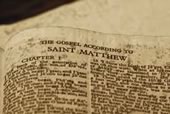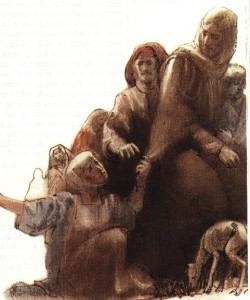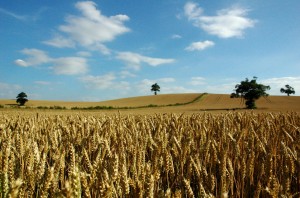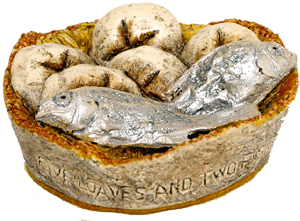The Gospel of Matthew (Part 4)
At the end of chapter 11, Jesus says,  “Come to me, all you that are weary and are carrying heavy burdens, and I will give you rest. Take my yoke upon you, and learn from me; for I am gentle and humble in heart, and you will find rest for your souls. For my yoke is easy, and my burden is light.” Chapter 12 begins with two examples of Jesus’ lessening the burden.
“Come to me, all you that are weary and are carrying heavy burdens, and I will give you rest. Take my yoke upon you, and learn from me; for I am gentle and humble in heart, and you will find rest for your souls. For my yoke is easy, and my burden is light.” Chapter 12 begins with two examples of Jesus’ lessening the burden.
Jesus and his disciples were walking through a grain field on the Sabbath. The disciples were in need of food, so they plucked heads of grain and ate them. (The Mosaic Law allowed this. See Deuteronomy 23:25.) The Pharisees object that the disciples are doing something prohibited on the Sabbath, as though what they were doing was ‘reaping.’ The incident of David and his companions eating the bread of the Presence, something allowed only to the priests, is found in 1 Samuel 21:1-6. Then King David provided for his hungry men, now Jesus the Son of David does the same. Jesus next cured a man with a withered hand. The Pharisees object that this is a violation of the Sabbath, but Jesus refers them to Hosea 6:6, “I desire mercy and not sacrifice” to demonstrate that alleviating suffering is perfectly right, even on the Sabbath.
Matthew tells us the reaction of the crowds and of the Pharisees: “All the crowds were amazed and said, ‘Can this be the Son of David?’ But when the Pharisees heard it, they said, ‘It is only by Beelzebul, the ruler of the demons, that this fellow casts out the demons.’” Jesus condemns the opinion of the Pharisees thus: “Therefore I tell you, people will be forgiven for every sin and blasphemy, but blasphemy against the Spirit will not be forgiven.” This seems to contradict the understanding that Jesus came to free everyone from sin. And this passage has caused some more scrupulous Christians to fret about somehow having committed the ‘unforgivable sin.’ But it is by imitating the Pharisees in attributing the mighty works of Jesus to the devil, rather than to the Holy Spirit – and only by doing this – that one can commit such a sin. Jesus knew that as long as one persisted in attributing his power to Satan, forgiveness would not even be requested. But Jesus’ forgiveness knows no bounds if one who has so sinned repented of that sin.
Matthew concludes this section by writing: “Someone told him, ‘Look, your mother and your brothers are standing outside, wanting to speak to you.’ But to the one who had told him this, Jesus replied, ‘Who is my mother, and who are my brothers?’ And pointing to his disciples, he said, ‘Here are my mother and my brothers! For whoever does the will of my Father in heaven is my brother and sister and mother.’” Jesus is stressing that mere earthly kinship with him is not enough. To be related to Jesus we must do the will of the Father. [In using the Greek word adelphoi, commonly translated “brothers,” Matthew is speaking of Jesus’ extended male kindred, not siblings born of Mary.]
Chapter 13
Space does not permit a detailed examination of Jesus’ parables. The biblical scholar M. Eugene Boring notes, “Parables generate new meaning in new situations…While a parable cannot ‘mean’ simply anything (it is not a Rorschach blot), it has no one meaning...It takes on meaning as it forces the hearer/reader to participate in the construction of meaning.” Examples of “new meaning in new situations” appear right in the Gospel: the interpretation of the Sower (13:18-23) and of the Weeds (13:36-43). These allegorical interpretations of the parables are products of the early Church. (Think of them as homilies on Jesus’ original parables of the same name.) The parables often look to the end-times when God will do the sorting out of good disciples from the wicked. Christians are called to address injustice in the world, but the ultimate judgment belongs to our patient God, who lets the ‘weeds’ continue to grow, in the hope they will repent.
Matthew has surrounded these parables with stories of increasing opposition to Jesus, from the Pharisees in the previous chapter and from the folks in Jesus’ hometown of Nazareth. From this point on, Jesus will focus on instructing his disciples on the nature of the new community of faith he is forming.
The killing of John the Baptist, one of God’s prophets, at a banquet stands in contrast to the wonderful banquets that Jesus provides in these chapters. These two stories have echoes of God’s feeding his people in the wilderness with manna (Exodus 16) and the prophet Elisha’s feeding of a crowd (2 Kings 4:42-44). Though both bread and fish are mentioned, all focus is on the bread that Jesus multiples to feed the crowd. These banquets remind us of the Eucharist and of the eternal banquet of heaven.
In between the stories of the feedings of the multitudes, Matthew inserts the story of Jesus and Peter walking on the water and of the Canaanite woman. Jesus sent his disciples ahead in a boat on a stormy sea. “And early in the morning [Jesus] came walking toward them on the sea. But when the disciples saw him walking on the sea, they were terrified, saying, ‘It is a ghost!’ And they cried out in fear. But immediately Jesus spoke to them and said, ‘Take heart, it is I; do not be afraid.’” Jesus does something only God can do, and his self-identification, in Greek, is actually ego eimi, “I AM,” God’s proper name. Jesus invites Peter to join him on the water. All is well until Peter focuses on the storm rather than on Jesus.

In a lengthy section on what is clean and what is unclean, Jesus encounters a Canaanite woman (regarded as unclean by the Pharisees) who wants a cure for her daughter. Not only does Jesus ignore her, but then compares Gentiles to ‘dogs.’ The Canaanite woman persists in faith. She acknowledges Jesus as the Jewish Messiah, she acknowledges that salvation is first for the Jews, but she will not be deterred, besting Jesus in his mini-parable. Jesus answers, “Woman, great is your faith! Let it be done for you as you wish.” Matthew’s community, struggling with the admission of Gentiles into the Church, would have found in this story a basis for joining Jewish Christians and Gentile Christians in one community.



 Entries(RSS)
Entries(RSS)